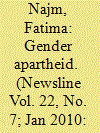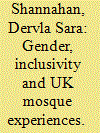|
|
|
Sort Order |
|
|
|
Items / Page
|
|
|
|
|
|
|
| Srl | Item |
| 1 |
ID:
093354


|
|
|
| 2 |
ID:
131475


|
|
|
|
|
| Publication |
2014.
|
| Summary/Abstract |
Access to, management and attendance of places of worship often takes gendered forms. Gender imbalances in UK mosques manifests in attendance and management patterns and is reflected in the facilities available. The sense that mosques are perceived widely as 'prayer-clubs for men' (Maqsood 2005: 4-5) is often reflected in the physical spaces and facilities made available to female worshippers, and it must be noted that some mosques do not provide any of the latter at all (Dispatches 2006). Shockingly, a recent survey found that 'women form part of the congregation in [only] half (51%) of the organisations surveyed' (Coleman 2009: 10). Relatedly, UK Mosque management committees privilege male involvement, decision-making and leadership roles, with figures of as few as 15% women in management positions (Asim 2011: 34) and more who 'will simply not entertain the idea' (Asim 2011: 39). Such imbalances reflect the specificities of the UK-religious context (Maqsood 2005) yet, globally, women's mosque involvement appears to be changing far more rapidly than here. This paper explores how gender, religious identity and sexualities interface with women's mosque access, involvement and experiences therein. It draws upon original research with a sample of women, and indicates that inclusivity is an important topic in UK mosques, far beyond gender
|
|
|
|
|
|
|
|
|
|
|
|
|
|
|
|
| 3 |
ID:
185928


|
|
|
|
|
| Summary/Abstract |
This study examines the role of technologies and infrastructures within the realm of religion, which so far has received little attention within infrastructural approaches in anthropology. Introducing the notion of ʻreligious infrastructure', the analysis sheds light on the socio-material processes contributing to the spread of a specific understanding of religious knowledge ilim in present-day Kyrgyzstan, and how these shape Muslim selfhood and Muslim sociality. In addition, the article illustrates how this infrastructure transforms and reconfigures under specific historical as well as technological circumstances. This temporal embeddedness is furthermore demonstrated by the moral imaginaries elicited via religious infrastructure, which may be taken as representative of how interlocutors during the research connect their everyday lives to past and future visions of leading meaningful lives.
|
|
|
|
|
|
|
|
|
|
|
|
|
|
|
|
| 4 |
ID:
184337


|
|
|
|
|
| Summary/Abstract |
Mosques in Europe have long been and are still at the centre of political debates, despite the decades-long presence of migrant Muslim communities in Europe. Scholars within geography and other disciplines have studied mosques extensively with a focus on urban space politics, and examined tensions and conflicts between migrant mosque communities and the broader segments of the local people. In this paper, I focus on DITIB, a Turkish umbrella mosque organization in Germany, and I carry these debates into a transnational terrain, re-theorizing mosques not only as political sites, but also everyday geopolitical spaces where national imaginaries and territorial struggles take place in the daily lives of mosque communities. Through this approach, I draw on the studies of feminist geographers who have provided a renewed perspective to classical geopolitics discussions by revealing how geopolitical relations, struggles, and interactions also operate in everyday spaces, relations, and bodies of ordinary people by reproducing the deep-seated exclusions, discriminations and contestations. This paper contributes to critical geopolitics and geographies of religion literatures as well as to broader discussions on the geopolitics of religion by analysing how a mosque organization is situated at the centre of geopolitical tensions, and how transnational and transregional controversies operate on the walls and properties of mosques and in everyday social/cultural activities of mosque communities.
|
|
|
|
|
|
|
|
|
|
|
|
|
|
|
|
|
|
|
|
|